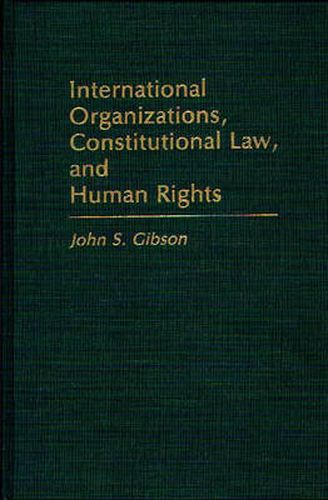Readings Newsletter
Become a Readings Member to make your shopping experience even easier.
Sign in or sign up for free!
You’re not far away from qualifying for FREE standard shipping within Australia
You’ve qualified for FREE standard shipping within Australia
The cart is loading…






Since World War II, remarkable progress has been made toward establishing more effective international laws and organizations to reduce opportunities for confrontation and conflict, and to enhance pursuit of security and well-being. This book offers a detailed record of that progress, as well as its meaning for our times and those ahead. Taking a historical, theoretical and case-study approach, John Gibson provides the reader with a broad understanding of how international organizations evolved to serve the interests of their member states, how the constitutional charters of organizations provide a coherent statement of goals and means to goals, and how these organizations are assuming increasing authority in the international system. The work traces the progression of international constitutional and human rights law, with an emphasis on the past 45 years. In the first part, Gibson discusses the historic processes of political relations and mutual reliance; the evolution of these patterns through World War II; the subsequent history of the United Nations; the prime goals of international constitutional law; and the organizations’ range of authority - from the high state to the supra-organization level. Part two offers a case study of the progression of international human rights law. Separate chapters trace the history of human rights in religion and philosophy and the role of the state in international law, while the concluding chapter on the United Nations Commission on Human Rights demonstrates how organizations acually function. This book will be a valuable resource for courses in international relations and international law, as well as an important addition to academic and professional libraries.
$9.00 standard shipping within Australia
FREE standard shipping within Australia for orders over $100.00
Express & International shipping calculated at checkout
Stock availability can be subject to change without notice. We recommend calling the shop or contacting our online team to check availability of low stock items. Please see our Shopping Online page for more details.
Since World War II, remarkable progress has been made toward establishing more effective international laws and organizations to reduce opportunities for confrontation and conflict, and to enhance pursuit of security and well-being. This book offers a detailed record of that progress, as well as its meaning for our times and those ahead. Taking a historical, theoretical and case-study approach, John Gibson provides the reader with a broad understanding of how international organizations evolved to serve the interests of their member states, how the constitutional charters of organizations provide a coherent statement of goals and means to goals, and how these organizations are assuming increasing authority in the international system. The work traces the progression of international constitutional and human rights law, with an emphasis on the past 45 years. In the first part, Gibson discusses the historic processes of political relations and mutual reliance; the evolution of these patterns through World War II; the subsequent history of the United Nations; the prime goals of international constitutional law; and the organizations’ range of authority - from the high state to the supra-organization level. Part two offers a case study of the progression of international human rights law. Separate chapters trace the history of human rights in religion and philosophy and the role of the state in international law, while the concluding chapter on the United Nations Commission on Human Rights demonstrates how organizations acually function. This book will be a valuable resource for courses in international relations and international law, as well as an important addition to academic and professional libraries.